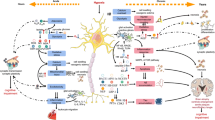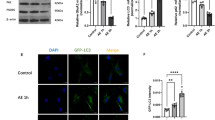Summary
This study investigated the role of glycogen synthase kinase-3β (GSK-3β) in isoflurane-induced neuroinflammation and cognitive dysfunction in aged rats. The hippocampi were dissected from aged rats which had been intraperitoneally administered lithium chloride (LiCl, 100 mg/kg) and then exposed to 1.4% isoflurane for 6 h. The expression of GSK-3β was detected by Western blotting. The mRNA and protein expression levels of tumor necrosis factor (TNF)-α, interleukin (IL)-1β and IL-6 were measured by real-time PCR and enzyme-linked immunosorbent assay (ELISA), respectively. Morris water maze was employed to detect spatial memory ability of rats. The results revealed that the level of GSK-3β was upregulated after isofurane exposure. Real-time PCR analysis demonstrated that isoflurane anesthesia increased mRNA levels of TNF-α, IL-1β and IL-6, which was consistent with the ELISA results. However, these changes were reversed by prophylactic LiCl, a non-selective inhibitor of GSK-3β. Additionally, we discovered that LiCl alleviated isoflurane-induced cognitive impairment in aged rats. Furthermore, the role of GSK-3β in isoflurae-induced neuroinflammation and cognitive dysfunction was associated with acetylation of NF-κB p65 (Lys310). In conclusion, these results suggested that GSK-3β is associated with isoflurane-induced upregulation of proinflammatory cytokines and cognitive disorder in aged rats.
Similar content being viewed by others
References
Newman S, Stygall J, Hirani S, et al. Postoperative cognitive dysfunction after noncardiac surgery: a systematic review. Anesthesiology, 2007,106(3):572–590
Monk TG, Weldon BC, Garvan CW, et al. Predictors of cognitive dysfunction after major noncardiac surgery. Anesthesiology, 2008,108(1):18–30
Mason SE, Noel-Storr A, Ritchie CW. The impact of general and regional anesthesia on the incidence of post-operative cognitive dysfunction and post-operative delirium: a systematic review with meta-analysis. J Alzheimers Dis, 2010,22:67–79
Zhang Y, Xu Z, Wang H, et al. Anesthetics isoflurane and desflurane differently affect mitochondrial function, learning, and memory. Ann Neurol, 2012,71(5):687–698
Zhang B, Tian M, Zhen Y, et al. The Effects of isoflurane and desflurane on cognitive function in humans. Anesth Analg, 2012,114(2):410–415
Wu X, Lu Y, Dong Y, et al. The inhalation anesthetic isoflurane increases levels of proinflammatory TNF-alpha, IL-6, and IL-1beta. Neurobiol Aging, 2012,33(7):1364–1378
Cameron B, Landreth GE. Inflammation, microglia, and Alzheimer’s disease. Neurobiol Dis, 2010,37(3):503–509
Acarin L, Gonzalez B, Castellano B. Neuronal, astroglial and microglial cytokine expression after an excitotoxic lesion in the immature rat brain. Eur J Neurosci, 2000,12(10):3505–3520
Lucas SM, Rothwell NJ, Gibson RM. The role of inflammation in CNS injury and disease. Br J Pharmacol, 2006,147(Suppl 1):S232–S240
Terrando N, Rei FA, Vizcaychipi M, et al. The impact of IL-1 modulation on the development of lipopolysaccharide-induced cognitive dysfunction. Crit Care, 2010,14(3):R88
Wan Y, Xu J, Ma D, et al. Postoperative impairment of cognitive function in rats: a possible role for cytokine-mediated inflammation in the hippocampus. Anesthesiology, 2007,106(3):436–443
Kim WY, Wang X, Wu Y, et al. GSK-3 is a master regulator of neural progenitor homeostasis. Nat Neurosci, 2009,12(11):1390–1397
Cohen P, Frame S. The renaissance of GSK3. Nat Rev Mol Cell Biol, 2001,2(10):769–776
Leroy K, Brion JP. Developmental expression and localization of glycogen synthase kinase-3beta in rat brain. J Chem Neuroanat, 1999,16(4):279–293
Yuskaitis CJ, Jope RS. Glycogen synthase kinase-3 regulates microglial migration, inflammation, and inflammation-induced neurotoxicity. Cell Signal, 2009,21(2):264–273
Hur EM, Zhou FQ. GSK3 signalling in neural development. Nat Rev Neurosci, 2010,11(8):539–551
Wang MJ, Huang HY, Chen WF, et al. Glycogen synthase kinase-3beta inactivation inhibits tumor necrosis factor-alpha production in microglia by modulating nuclear factor kappaB and MLK3/JNK signaling cascades. J Neuroinflammation, 2010,7:99
Steinmetz J, Christensen KB, Lund T, et al. Long-term consequences of postoperative cognitive dysfunction. Anesthesiology, 2009,110(3):548–555
Ramaiah R, Lam AM. Postoperative cognitive dysfunction in the elderly. Anesthesiol Clin, 2009,27(3):485–496
Sanders RD, Maze M. Neuroinflammation and postoperative cognitive dysfunction: can anaesthesia be therapeutic? Eur J Anaesthesiol, 2010,27(1):3–5
Cao XZ, Ma H, Wang JK, et al. Postoperative cognitive deficits and neuroinflammation in the hippocampus triggered by surgical trauma are exacerbated in aged rats. Prog Neuropsychopharmacol Biol Psychiatry, 2010, 34(8):1426–1432
Terrando N, Monaco C, Ma D, et al. Tumor necrosis factor-alpha triggers a cytokine cascade yielding postoperative cognitive decline. Proc Natl Acad Sci USA, 2010,107(47):20518–20522
Cibelli M, Fidalgo AR, Terrando N, et al. Role of interleukin-1beta in postoperative cognitive dysfunction. Ann Neurol, 2010,68(3):360–368
Barrientos RM, Sprunger DB, Campeau S, et al. BDNF mRNA expression in rat hippocampus following contextual learning is blocked by intrahippocampal IL-1beta administration. J Neuroimmunol, 2004,155(1–2):119–126
Zhao YL, Xiang Q, Shi QY, et al. GABAergic excitotoxicity injury of the immature hippocampal pyramidal neu rons’ exposure to isoflurane. Anesth Analg, 2011,113(5):1152–1160
Zhao Y, Jin X, Wang J, et al. Isoflurane enhances the expression of cytochrome C by facilitation of NMDA receptor in developing rat hippocampal neurons in vitro. J Huazhong Univ Sci Technol [Med Sci], 2011,31(6):779–783
Li SY, Xia LX, Zhao YL, et al. Minocycline mitigates isoflurane-induced cognitive impairment in aged rats. Brain Res, 2013,1496:84–93
Zhu LQ, Wang SH, Liu D, et al. Activation of glycogen synthase kinase-3 inhibits long-term potentiation with synapse-associated impairments. J Neurosci, 2007,27(45):12211–12220
Zhu LQ, Liu D, Hu J, et al. GSK-3 beta inhibits presynaptic vesicle exocytosis by phosphorylating P/Q-type calcium channel and interrupting SNARE complex formation. J Neurosci, 2010,30(10):3624–3633
Beurel E, Jope RS. The paradoxical pro- and anti-apoptotic actions of GSK3 in the intrinsic and extrinsic apoptosis signaling pathways. Prog Neurobiol, 2006, 79(4):173–189
Author information
Authors and Affiliations
Corresponding author
Additional information
This work was supported by grants from the National Natural Science Foundation of China (No. 81271233, No. 81200880, No. 31240030).
Rights and permissions
About this article
Cite this article
Li, Sy., Chen, X., Chen, Yl. et al. Role of GSK-3β in isoflurane-induced neuroinflammation and cognitive dysfunction in aged rats. J. Huazhong Univ. Sci. Technol. [Med. Sci.] 33, 530–535 (2013). https://doi.org/10.1007/s11596-013-1154-3
Received:
Revised:
Published:
Issue Date:
DOI: https://doi.org/10.1007/s11596-013-1154-3




